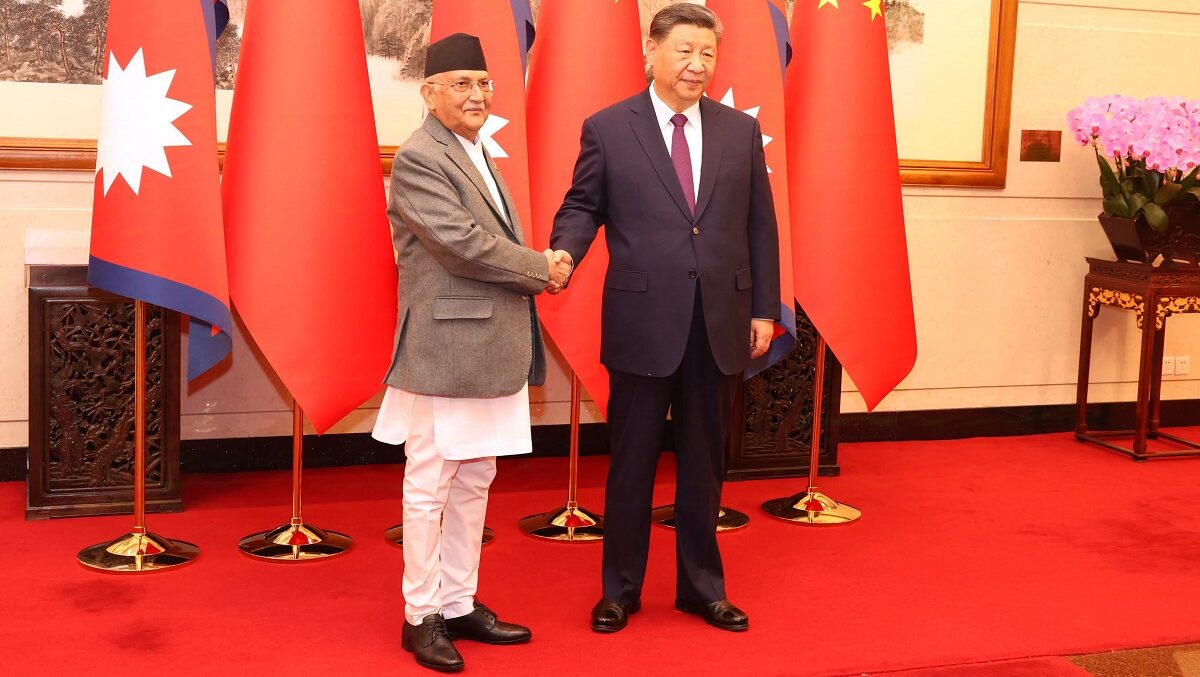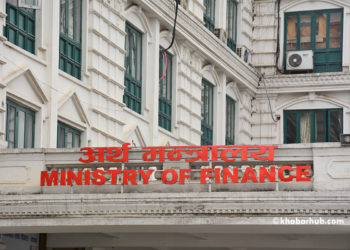KATHMANDU: Nepal and China have expressed their readiness to sign a Memorandum of Understanding (MoU) on building the Trans-Himalayan Multi-Dimensional Connectivity Network and the Framework for Belt and Road Cooperation.
Both countries have committed to strengthening connectivity in areas such as ports, roads, railways, aviation, power grids, and telecommunications, with the aim of transforming Nepal from a landlocked country to a land-linked country.
This was stated in the Joint Statement issued following the conclusion of Prime Minister KP Oli’s four-day official visit to China.
As agreed, the fourth phase of the China-aided Araniko Highway maintenance project and the Hilsa-Simikot Road project will be advanced, while the second phase of the Kathmandu Ring Road Improvement Project will be implemented.
The leaders also welcomed the signing of Letters of Exchange for the approval of the China-aid project for the feasibility study of the Tokha-Chhahare Tunnel.
The two sides reaffirmed their support for each other’s core interests, including Nepal’s firm commitment to the one-China principle, and China’s support for Nepal’s sovereignty and independence.
While promoting the repair of the Syaphrubesi-Rasuwagadhi Highway, both sides agreed to expedite the removal of obstacles along the highway and its subsequent construction, recognizing that these projects will enhance connectivity between the two countries, as mentioned in the joint statement.
Both sides expressed their commitment to ensuring the timely and efficient implementation of the agreements, consensus, and decisions made, and to completing the programs, projects, and activities being carried out.
“The two sides agreed to strengthen the synergy of their development strategies and pursue deeper, more concrete, high-quality Belt and Road cooperation,” the joint statement said.
The two countries agreed to expedite the construction of projects for the development of the Koshi Economic Corridor, Gandaki Economic Corridor, and Karnali Economic Corridor.
Similarly, Nepal and China agreed to enhance the development of port entry points, streamline customs clearance processes, facilitate two-way travel, promote bilateral economic and trade cooperation, and support the social and economic development of border areas.
Both sides praised the smooth and orderly operation of the Jilong/Keyrung-Rasuwagadhi port, the Zhangmu-Kodari port, the Pulan-Yari port, and the Lizi-Nechung (Korala, Mustang) port.
Furthermore, both countries welcomed the full resumption and normal operation of 14 traditional China-Nepal border trade points in 2024, which have been essential in promoting bilateral trade and improving the livelihoods of border residents.
The Nepali side also requested the Chinese government to consider opening additional bilateral and international ports.
“The Chinese side will facilitate the construction of the China-aided Inland Clearance Depot (ICD) and Integrated Check Post (ICP) at Korala, Mustang,” the joint statement noted.
The two sides expressed a willingness to advance the feasibility study of the Jilong/Keyrung-Kathmandu Cross-Border Railway and planned to hold the 9th Working Meeting on China-Nepal Railway Cooperation.
The joint statement also highlighted the growing importance of civil aviation ties between China and Nepal. Both sides expressed support for their air transport enterprises to establish air routes between Chinese and Nepali cities such as Pokhara and Lumbini, based on market demand, in order to facilitate economic and trade relations and two-way travel.
The Nepali side also requested that the Chinese side expedite the development of the Madan Bhandari University of Science and Technology and the construction of a sports stadium in Damak, Jhapa, and the Amargadhi City Hall Complex in Dadeldhura.
Both sides agreed to expedite the feasibility study of the China-aided Jilong/Keyrung-Rasuwagadhi-Chilime 220KV Cross-Border Power Transmission Line.
They also agreed to continue supporting cooperation between telecommunication operators of the two countries and to maintain and expand cross-border land cable projects.
The two sides agreed to deepen pragmatic cooperation in areas such as economy and trade, connectivity, infrastructure, investment, agriculture, industry, health, disaster relief, and poverty alleviation to promote shared development.
The MoU on Trade Promotion Cooperation was signed, with both sides committed to strengthening trade exchanges and enhancing the scale and level of bilateral trade.
The Chinese side reiterated its support for Chinese enterprises to invest and do business in Nepal based on market and commercial principles.
Nepal reiterated its commitment to improving the business environment and providing support for Chinese enterprises.
The two sides agreed to sign the Project Development Agreement for the China-Nepal Friendship Industrial Park as soon as possible to promote the early commencement of construction and operation of the industrial park.
The Nepali side also expressed its appreciation to China for granting Nepal zero-tariff treatment on 100 percent of tariff lines as one of the least developed countries.
China welcomed Nepal’s efforts to expand the export of high-quality agricultural products such as Nepali haylage, plant-derived medicinal materials, and tea to China, and agreed to deepen cooperation in agriculture, livestock, and fisheries.
Both countries committed to further expanding exchanges and cooperation, focusing on poverty alleviation, development, livelihood improvement, and rural revitalization.
China pledged to help strengthen Nepal’s personnel capacity in relevant fields, continue poverty reduction projects, and support Nepal in improving its citizens’ quality of life.
The two sides agreed to continue strengthening health and medical cooperation and expedite the China-aided Bone Marrow Transplant Service project at the B.P. Koirala Memorial Cancer Hospital.
They also agreed to fully utilize China-aided hospitals in Nepal and support the Chinese medical team in establishing a new medical service point at the Civil Service Hospital in Kathmandu.
Furthermore, they agreed to study the establishment of a new CAR-T cell laboratory at the Civil Service Hospital to treat cancer patients.
They also agreed to renew the MoU on Traditional Medicine Cooperation, establish the China-Nepal Traditional Medicine Cooperation Commission, and continue supporting the China-Nepal Traditional Chinese Medicine Center in providing free medical treatment, personnel training, and medical services in Nepal.
During the talks, the Nepali side congratulated China on the 75th anniversary of the founding of the People’s Republic of China, praised the country’s achievements in the new era, and expressed support for China’s efforts to build a great modern socialist country and achieve national rejuvenation through the Chinese path to modernization.
The Chinese side spoke highly of Nepal’s efforts to maintain political stability and promote economic and social development, and wished the Nepali people success in realizing the national aspiration of “Samriddha Nepal, Sukhi Nepali” (“Prosperous Nepal, Happy Nepali”).
Both sides expressed their readiness to continue close bilateral engagement and share governance experiences.
They also praised the implementation of the MoU on Translation and Publication of Classics.
Prime Minister KP Sharma Oli’s visit to China, which took place from December 2 to 5, 2024, was conducted at the invitation of Chinese Premier Li Qiang.
During the visit, Prime Minister Oli held meetings with President Xi Jinping, Premier Li Qiang, and Chairman of the Standing Committee of the National People’s Congress Zhao Leji.
During these discussions, both sides reviewed the progress in China-Nepal relations since the establishment of diplomatic ties in 1955, with particular emphasis on the strategic partnership that was strengthened by high-level visits, including President Xi’s historic state visit to Nepal in 2019.
The Chinese side also expressed its willingness to visit Nepal at a mutually convenient time, with both sides agreeing to maintain communication through diplomatic channels.
As the year 2025 marks the 70th anniversary of diplomatic relations, both sides discussed ways to make this milestone momentous and agreed to further strengthen high-level exchanges, political mutual trust, and mutually beneficial cooperation based on the principles of peaceful coexistence and good neighborliness.
The two sides reaffirmed their support for each other’s core interests, including Nepal’s firm commitment to the one-China principle, and China’s support for Nepal’s sovereignty and independence.
Both sides agreed to continue consultations on boundary management and law enforcement cooperation, strengthening exchanges and mutual support in various areas, including cybercrime, law enforcement training, and police supplies.
They also pledged to enhance exchanges in areas like youth, education, culture, tourism, and think tanks, to forge closer ties and deepen people-to-people exchanges.
Nepal welcomed China to hold promotional activities for Nepal Visit Year 2025, while China expressed support for Nepal’s cultural events and activities in both countries.
The two sides agreed to organize a Chinese Film Festival in Nepal in 2025 and support friendly exchanges in sports, youth, and educational fields.
China also pledged to support Nepali students in pursuing education in China.
The joint statement concluded with a commitment to advancing the Global Development Initiative, promoting global governance, and ensuring equitable international relations based on the UN Charter’s principles.
Prime Minister Oli expressed his appreciation for China’s hospitality and friendship, and invited Chinese leaders to visit Nepal.
The Chinese side also expressed its willingness to visit Nepal at a mutually convenient time, with both sides agreeing to maintain communication through diplomatic channels.









Comment